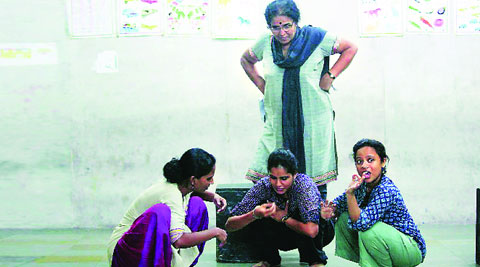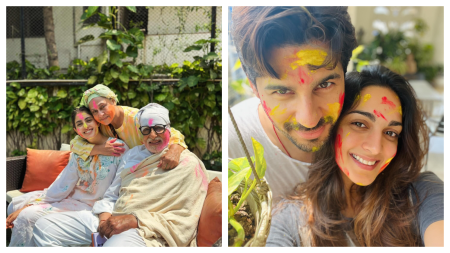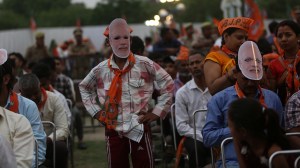- India
- International
Notes from the margins
Dalit writer Urmila Pawar’s memoirs and her hard-won freedom are the focus of a new Marathi play
 Play it right: Actor-director Sushama Deshpande at the rehearsal of a play based on Urmila Pawar’s autobiography Aaydan along with actors Shubhangi Savarkar, Shilpa Sane and Nandita Dhuri in Mumbai
Play it right: Actor-director Sushama Deshpande at the rehearsal of a play based on Urmila Pawar’s autobiography Aaydan along with actors Shubhangi Savarkar, Shilpa Sane and Nandita Dhuri in Mumbai
Her raspy voice bursts out, almost drowning those of the others in the room, as she intones the choicest of abuses in Marathi. The others repeat after her, till she stops one of the girls in mid-sentence and points out, “Gaav undaari nahi, gaav undgi (not a drifter, a tramp).” But her stern expression quickly gives way to a smile. Soon, Urmila Pawar is giggling and everyone else in the room cracks up as well. “I am no longer used to mouthing such obscenities,” she says.
Pawar, 69, is at an informal play reading session with Mumbai-based thespian Sushama Deshpande at Pawar’s Kandivali apartment in Mumbai. With them are three young actors, Shubhangi Savarkar, Shilpa Sane and Nandita Dhuri. Together, they are recreating a scene from Pawar’s autobiography, Aaydan (2003), that Deshpande is adapting for the stage as a Marathi play by the same name.
The play is a collaboration between two stalwarts of the Marathi literary circle. Pawar is a noted Dalit writer and feminist, who has authored several critically acclaimed books, including her two collections of short stories, Sahav Bot (Sixth Finger) and Mother Wit. Deshpande, a well-known figure in the Mumbai theatre circuit, is best known for her play Vhay, Mee Savitribai (Yes, I’m Savitribai), a provocative commentary on caste discrimination and women’s issues based on social reformer Savitribai Phule’s life. The 59-year-old, who plays the titular character, has been performing the one-woman show for over 25 years.
“In Aaydan, Urmila delicately navigates her readers through her long journey from the harsh landscape of the Konkan region to Mumbai — first as a Mahar and later as a woman — as she challenged the conventions of both caste and gender to emerge as an activist and a strong literary voice,” says Deshpande, who has known Pawar since the 1980s through Maitrini, a women’s group they were both part of.
Although Deshpande was familiar with the work, considered one of the most influential Dalit autobiographies, it was a nudge from Mumbai playwright Ramu Ramanathan that led her to consider adapting it. A year after the book’s English translation released in 2009, she asked Pawar’s permission to adapt it for the stage. She was turned down, because the author felt there wouldn’t be a theatre audience for her story. But she eventually came around. Soon after, Deshpande finalised the cast and started to work on the adaptation, which she says is merely an edited version of the book.
Deshpande believes that retaining the voice of Aaydan’s narrator has allowed her subject’s fiery personality to be translated from paper on to the actors. “We didn’t want to rewrite it. The idea was to retain her writing style which is candid and witty. It’s what makes the memoir a moving account without weighing heavy on the reader,” says Deshpande, who spent close to two years on the draft.
Pawar began writing in 1988 (Sahav Bot). The strength of her writing, says Deshpande, lies in the way her stories use the mundane, everyday acts and objects to remind the reader of the deep roots of caste discrimination and patriarchy. “Her family lived on limited means, barely making ends meet, especially after her father’s death. Studying with upper caste girls, she would be reminded of her origins through simple things, such as the sweetmeats they would bring in their tiffin boxes. She couldn’t afford these, but she was also expected not to be able to,” says Deshpande. Pawar’s writing, however, infuses these incidents with humour. For instance, when she experienced her first menstrual cycle, she started to cry. Her mother handed her a piece of cloth and asked her to sit in one corner lest she make things in the house “impure” by touching them. She writes, “as if I wasn’t discriminated enough by others outside, now family too, has set rules for me”. Several such incidents from Pawar’s early years have made it to the play.
Pawar says that while those members of the Dalit community who have adopted Ambedkar’s way of life tend to be more progressive, not much has changed for Dalit women. “In fact, it’s worsened,” she says, citing the example of how, in her younger years, she noticed that the daughters-in-law would have to survive on a meal of salted water cooked as soup, with rice. If Pawar’s conversion to Buddhism when she was 12, “after Babasaheb’s (Dr B.R. Ambedkar) call to renounce the caste-based Hindu religion,” laid the foundation of her personal growth, her discovery of feminism after moving to Mumbai is perhaps the second-most important event that shaped her life. She calls 1975, declared as International Women’s Year, a landmark in both her own life as well as the country’s approach to women’s rights. Led by activists such as Chhaya Datar, Jaya Velankar and Hira Bansode, women took to the streets to demand their rights. “We spoke about the sanitation needs of village women, against dowry and the use of women as guinea pigs in the family planning experiments at the time. The movement was instrumental in the amendment of IPC 498, the dowry law,” says Pawar. “A change also started to reflect in the society, where women were becoming more assertive of their rights and men more open. But then Babri Masjid fell and all our efforts were undone as cultural and religious identity once again came to the forefront.” Now, both Deshpande and Pawar believe that the movement has lost steam and will be difficult to revive, much like the Dalit movement that suffers from a lack of leadership.
While the narrative in the book meanders from Pawar’s personal story to the lives of those around her, the play, stresses Deshpande, will focus on the protagonist. The two-hour play will throw light on Pawar’s life in the big city, where her journey as a literary figure wasn’t free of resistance from her own household. “I shared a bittersweet relationship with my husband who supported me, but also expected me to fulfill the typical role of a wife, catering to kitchen duty and household chores,” says Pawar. She may not have been able to write with such honesty had her husband been alive, she says.
Deshpande’s play uses a minimalist setting — a few bamboos and bamboo stools are all the props that she needs. The use of bamboo is integral to the play. The title of the memoir refers to the cane baskets woven by women from several Dalit communities. Pawar, who grew up watching her widowed mother weave aaydans as she strove to make ends meet, equates the act with her writing as she weaves the stories from her life. “I was a rebellious child and had numerous fights with my mother while growing up. But by the time I wrote this book, I felt I had taken her place. Like her, I was attempting to make the most of my life in a patriarchal society, I had lost my husband and my son and my two girls misunderstood me because they could not understand my need to have a life beyond home. It’s as if our lives had been juxtaposed,” she says.
Photos
Apr 25: Latest News
- 01
- 02
- 03
- 04
- 05









































